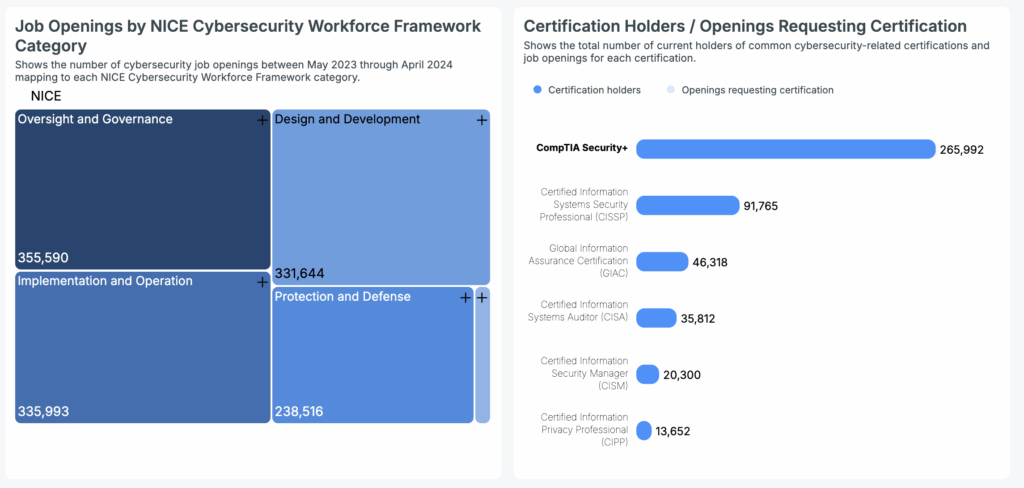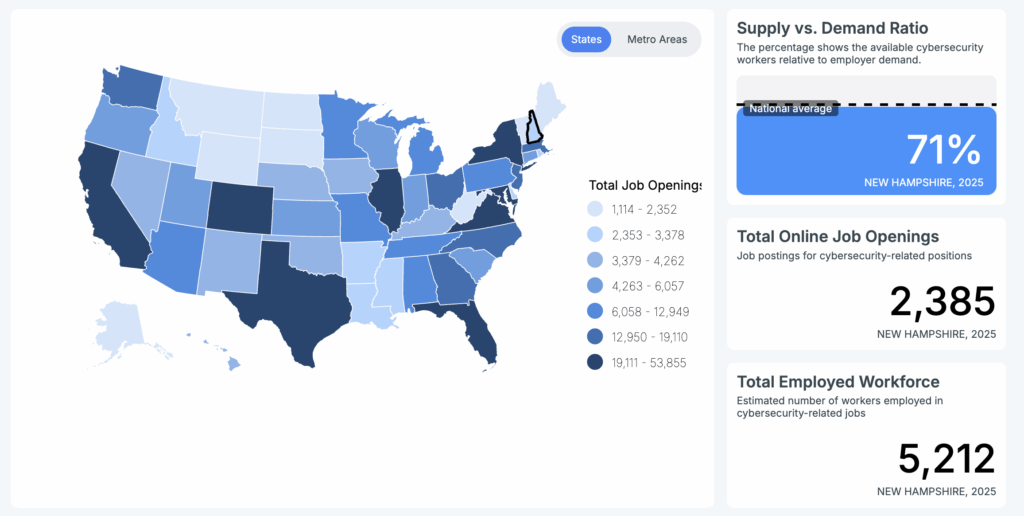- Associate degrees
- Bachelor’s degrees
- Master’s degrees
- Cybersecurity certifications
- Cybersecurity jobs
- FAQs
The following guide is a comprehensive overview of cybersecurity schools in New Hampshire.
The economy of New Hampshire is small but fairly well diversified. The largest industries as far as employment are professional business services, manufacturing, government, and healthcare.
Ad
cybersecurityguide.org is an advertising-supported site. Clicking in this box will show you programs related to your search from schools that compensate us. This compensation does not influence our school rankings, resource guides, or other information published on this site.
Featured Cybersecurity Degree Programs
| School Name | Program | More Info |
|---|---|---|
| Southern New Hampshire University | Online BS in Cybersecurity or Online MS in Cybersecurity | website |
| Purdue Global | Online BS in Cybersecurity | website |
| Grand Canyon University | Online BS in Cybersecurity or Online MS in Cybersecurity | website |
| UC Berkeley School of Information | Master’s in Cybersecurity | No GRE/GMAT Required | website |
The list of the largest individual employers in New Hampshire is dominated by healthcare and education institutions, with financial intermediaries (insurance and investment companies) also represented.
All of the largest employment industries have become prime targets for cybercriminals and therefore, must maintain rigorous cybersecurity efforts.
The climate for cybersecurity in New Hampshire
The state of New Hampshire has been relatively proactive in developing resources and strategic direction to combat cybercrime and secure government data, systems, and networks.
The New Hampshire Department of Information Technology was created to manage and coordinate all technology resources in the state executive branch of government. This includes the state’s cybersecurity website and the New Hampshire Cyber Integration Center (NHCIC).
The NHCIC was created by order of the governor in 2016. It is responsible for protecting state government information resources.
New Hampshire is also now one of a growing number of states with their chief information officer to oversee government data security.
Private enterprise cybersecurity resources are limited in keeping with the size of the state’s economy. The workforce is fairly small thus far, but demand for new cybersecurity professionals far exceeds supply, so industry employment will increase as rapidly as the supply of qualified experts allows.
The limitations on workforce availability could be partially due to the state’s proximity to and thus competition with Boston, which is a sizeable cybersecurity employment market.
Cybersecurity education in New Hampshire
Being that New Hampshire has a small cybersecurity community thus far, one would expect few degree and certification options to be available from state colleges and universities.
However, several institutions have stepped up to the cybersecurity plate assembled specialized faculty, and developed programs to educate the next generation of infosec professionals.
The University of New Hampshire (UNH) has its own Center for Cybersecurity Leadership, Education, and Outreach (CCLEO). UNH is also the only New Hampshire school to be designated by the National Security Agency and the Department of Homeland Security as a Center of Academic Excellence in Cyber Defense Education (CAE-CDE). UNH has developed two different degree programs related to information assurance.
Southern New Hampshire University (SNHU), which is primarily focused on online degree programs, now offers two distinct online cybersecurity degrees. One of these is a master’s degree and one is a bachelor’s degree.
Related resources
Cybersecurity associate degrees in New Hampshire
The highly technical nature of most cybersecurity careers requires extensive training and education. Still, many entry-level positions can be found that require only an associate’s degree.
For many students, an associate’s degree is a preferable alternative because programs can be completed in two years or less. However, once a career is established, employment options will be greatly enhanced by returning to school for a four-year bachelor’s degree.
There are currently three cybersecurity associate’s degrees available from New Hampshire community colleges. All three are provided with on-campus formats and only Great Bay Community College offers an online format.
- Program: Associate in Science in Cyber Security Infrastructure
Credits: 61-62
Cost per credit: $215 in state | $490 out of state
Delivery method: Campus & online
Learn more: Program details - Program: Associate in Cybersecurity Investigations
Credits: 63
Cost per credit: $215 in state | $490 out of state
Delivery method: Campus
Learn more: Program details
Cybersecurity bachelor’s degrees in New Hampshire
Cybersecurity employers will typically require candidates to have at least a bachelor’s degree for most job openings.
Degrees in most technology sectors are often acceptable, including STEM disciplines. Having a degree with a cybersecurity specialty, however, or at least a concentration in cybersecurity, will give professionals a leg up on the competition in the job market.
At present, New Hampshire schools are offering three bachelor’s degree programs with cybersecurity specialties, two online and one in campus-based classwork.
- Program: Computer Information Technology (B.S.)
Credits: 120
Cost per credit: $314 in state | $379 out of state
Delivery method: Online
Learn more: Program details - Program: Computer Science Major: Cybersecurity Option (B.A.)
CAE designation: CAE-CD
Credits: 128
Cost per credit: $485 in state | $1103 out of state
Delivery method: Campus
Learn more: Program details - Program: Bachelor of Science in Information Technologies – Cyber Security
Credits: 120
Cost per credit: $320
Delivery method: Online
Learn more: Program details
Cybersecurity master’s degrees in New Hampshire
Particularly as cybersecurity careers progress to higher levels of corporate management, master’s degrees are becoming more desirable.
For professors of cybersecurity and those seeking to have careers in research or cybersecurity consulting, master’s degrees have become nearly essential.
Today, there is only one cybersecurity master’s degree program available in New Hampshire in on-campus settings. There are, however, two options being offered via online formats.
- Program: Master of Science in Cyber Security
CAE designation: CAE-CD
Credits: 120
Cost per credit: $627
Delivery method: Online
Learn more: Program details - Program: Cybersecurity Engineering (M.S.)
CAE designation: CAE-CD
Credits: 30-33
Cost per credit: $800 in-state | $985 out of state
Delivery method: Campus
GRE requirement: Not required
Learn more: Program details - Program: M.S. in Cybersecurity Policy and Risk Management (CPRM)
CAE designation: CAE-CD
Credits: 30
Cost per credit: $570 in-state | $640 out of state
Delivery method: Online
GRE requirement: Not required
Learn more: Program details
Cybersecurity certifications in New Hampshire
Cybersecurity certifications are available for various cybersecurity specialties and general infosec knowledge at nearly all career levels.
Students at the initial stages of their education, specialist cybersecurity professionals who wish to update or expand upon their expertise, and even those looking to obtain an advanced degree but lacking the time and/or resources required to complete one, can all find appropriate certification programs.

Here Cyberseek’s data that provides a definitive look at the current landscape of common cybersecurity certifications across the nation:
- CompTIA Security+: 265,992 certification holders
- CISSP: 91,765 certification holders
- GAC: 46,318 certification holders
- CISA: 35,812 certification holders
- CISM: 20,300 certification holders
- CIPP: 13,652 certification holders
Right now, New Hampshire schools have two cybersecurity certifications on offer, both with campus-based classroom formats.
- Program: Networking and Cybersecurity Operations Certificate
Credits: 12
Cost per credit: $215 in state | $490 out of state
Delivery method: Campus
Learn more: Program details - Program: Certificate in Cybersecurity & Healthcare IT
Credits: 18
Cost per credits: $215 in state | $490 out of state
Delivery method: Campus
Learn more: Program details
Cybersecurity jobs in New Hampshire
Cyberseek’s data provides a definitive look at the current landscape of common cybersecurity certifications across the nation:
- CompTIA Security+: 265,992 certification holders
- CISSP: 91,765 certification holders
- GIAC: 46,318 certification holders
- CISA: 35,812 certification holders
- CISM: 20,300 certification holders
- CIPP: 13,652 certification holders
New Hampshire is a small market when it comes to cybersecurity. Recently, the state had 5,212 people employed in some aspect of information security, according to Cyberseek. Employers also posted 2,385 new cybersecurity job openings.

The density of information security employment as compared to the state’s population is one of the lowest in the country. This is likely due at least in part to the fact that the southern region of the state, which is the most densely populated, has a high percentage of citizens who commute to Boston for employment. Thus, many of the state’s residents work in another state.
At the same time, however, the existing supply of cybersecurity workers is considerably lower than the already strained workforce across the rest of the country.
So, cybersecurity professionals finding a home in New Hampshire should be in high demand by employers. The bulk of the information assurance employment opportunities in the state are in the southernmost region.
Cybersecurity professionals employed in New Hampshire are being paid well relative to other states. Focusing on security analysts as a representative cybersecurity career, the current average hourly wage is $60.05, and the average annual salary is $124,910 according to Bureau of Labor Statistics‘ data.
New Hampshire’s cost of living is reportedly about 10 percent higher than the national average. This doesn’t take into account that state residents bear one of the very lowest tax burdens in the country. There is no personal income tax and no general sales tax.
Cybersecurity in New Hampshire
The economy of New Hampshire is fairly small, and so too is the size of the current cybersecurity workforce. But demand outweighs supply by an even wider margin than most other US states.
This could be in part due to competition for cybersecurity professionals from nearby Boston, currently a considerably larger employment market.
Educational institutions are stepping forward and developing quality information security degree and certification programs, however. So the supply of infosec professionals should begin growing in the near future.
Frequently Asked Questions
Top industries include healthcare, education, financial services, government, and manufacturing, all of which require strong cybersecurity defenses.
Yes. New Hampshire offers cybersecurity associate, bachelor’s, and master’s degree programs through schools like the University of New Hampshire (UNH), Southern New Hampshire University (SNHU), and Granite State College.
Cybersecurity analysts in New Hampshire earn an average of $62.35 per hour, or about $129,690 annually, according to the Bureau of Labor Statistics (2025).
Yes. The University of New Hampshire and SNHU offer cybersecurity-related master’s programs, including online formats for working professionals.
Three community colleges—Great Bay Community College, Manchester Community College, and NHTI-Concord’s Community College—offer associate-level programs, with Great Bay providing an online format.
The New Hampshire Department of Information Technology oversees government IT security, while the New Hampshire Cyber Integration Center (NHCIC) works to protect state systems and data.
The state’s workforce is relatively small and competes with the larger Boston job market, leading to high demand but limited supply of cybersecurity experts.
Students can pursue bachelor’s programs at UNH (Durham), SNHU (Manchester), and Granite State College (Concord), with options available both on-campus and online.
Yes. Schools like SNHU and UNH welcome out-of-state and international students in their online cybersecurity degree tracks.
The University of New Hampshire is designated as a CAE-CDE by the NSA and DHS, making it the state’s leading institution for cybersecurity education and research.
Yes. NHTI-Concord’s Community College and River Valley Community College offer certification programs for students seeking targeted cybersecurity training.
Strong. Despite its smaller size, New Hampshire had 5,212 cybersecurity workers employed and 2,385 new job openings recently, according to CyberSeek data.
Yes. Despite its smaller market, high salaries, low tax burden, and growing demand make New Hampshire is an attractive option for launching a cybersecurity career, especially in the southern region near Boston.
Yes. Southern New Hampshire University (SNHU) offers fully online bachelor’s and master’s programs in cybersecurity, while Granite State College also provides online options.
Although the state’s cost of living is about 10 percent higher than the national average, professionals benefit from no personal income tax and no general sales tax.